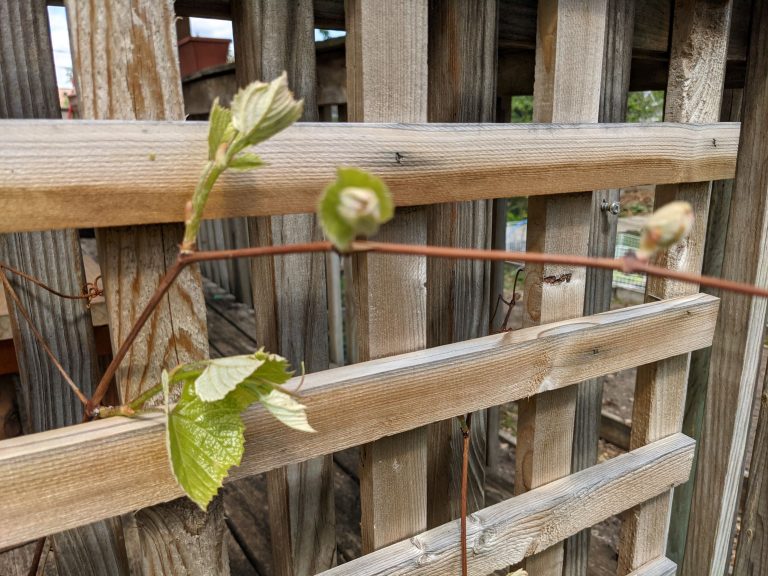Why I Whistle

In This Issue
Notes: Why I Whistle · New Words: I Once Walked Around My House Upside-Down · In Other Words: Mary Oliver and the Opportunity Cost of Writing Poetry · News: Potting Up the Basil and Tomatoes · Postscript: Ditching School to Whistle
Get “Notes in Glass Bottles” in your inbox every Sunday.
NOTE
Why I Whistle
Maybe it’s an act of defiance, or maybe it’s just fun to ornament the air
I’m a notorious whistler, at least among members of my family. My oldest daughter diagnoses it as a sure sign that I have ADHD because often my whistling echoes some catchy tune I’ve heard recently: a hymn at church, a song I’ve been streaming, the little melody my phone plays for a wakeup alarm, the theme music to a radio show. Once I’ve caught that earworm, I might go around whistling it over and over until even I notice I’m doing it and make myself stop.
When I’m stressed, I tend to absentmindedly start whistling Christmas music; I don’t know why, but I do, and sometimes I don’t realize it until someone says—“Dad’s stressed, he’s whistling ‘Silver Bells’ again.” This often happens when we’re rushing around right before we leave on a long road trip. As annoying as this habit is, it beats the alternatives for blowing off stress.
It’s an effective palliative for the stress of living in the 2020s, too. Every morning, the radio dutifully reports on how the world is burning down; I whistle in reply, just to keep from despair. It’s a small act of defiance, maybe, but keeping from despair is a prerequisite of hope, and hope is the small mystard seed of justice and peace.
I whistle while I work, of course, usually doing chores around the house on a Saturday morning. I whistle to pass the time on a long walk, and I’ve been known to whistle while I shop, too. “Come and find me in ten minutes,” I’ll say to my kids when we go our separate ways in a big store. “Just follow the whistling. Any requests?”
Sometimes I whistle for the sheer fun of ornamenting the air: there are moments in life that call for a soundtrack. Back before recorded music made us all feel musically incompetent, people used to sing. I don’t sing, at least not outside church; I’d have to remember the words to the songs, and the range of my singing voice is limited, and I tend to be pitchy. In grade school I played the flute, and then the cello—but only briefly, because with my bad eyesight I couldn’t see the sheet music. When you know how to whistle, you can make music whenever the occasion calls for it.
I’m not always a mockingbird, whistling whatever I’ve last heard; I like to make up original tunes, too. I’ve gotten pretty good at it, at least in my own estimation—usually these small compositions have an audience of one, myself, and once I’m done, they’re gone, melted into the ephemera—unless maybe God or the angels keep track of these things, filing them away as part of creation’s permanent collection.
Maybe that’s so, but even if it’s not, the simple joy of throwing something beautiful out into the world, even if it’s snatched away on the wind, is reason enough for me to wet my lips and begin.
NEW WORDS
I Once Walked Around the House Upside-Down
I once walked around the house upside-down,
the ceiling fan sprouting like an alien flower
from a diamond-encrusted field of snow,
coats craning on tippy-toe atop their hooks,
slabs of books hanging from dark shelves
like bats thick in their caves, dreaming;
and the frowny old man in the green painting
seeming to smile now, standing on his head —
startled by this new understanding, this revelation
that a child with naught but a pot lid
could render so radical a revolution.
You can read my commentary on this poem at its page: Once Walked Around the House Upside-Down.
IN OTHER WORDS
Mary Oliver and the Opportunity Cost of Writing Poetry
I hate to tap Krista Tippett’s show two weeks in a row, but she had another great interview, this time with the renowned American poet Mary Oliver. I knew her A Poetry Handbook was considered a classic, but I had never really been introduced to her as a poet. It turns out I’ve been deprived as a result, a problem I’m addressing by buying some of her books.
She has an interesting story, and a spirituality shaped by that story. She chose to live in what most people would call poverty in exchange for the freedom to spend her days wandering the woods with a notebook and pencil, foraging for poems (and food for supper, too). Everything has its price; who is to say she didn’t get a bargain in the end? By the end of her life she had won the Pulitzer Prize for poetry, and the National Book Award, too, but her poetry was also a healing balm for the wounds of her childhood; and in giving them to the world, she healed and saved many others, too. You can hear her interview or read a transcript at On Being.
NEWS
Putting Up the Basil and Tomatoes
If you missed my short talk with OSV’s Tracy Stewart on imaginative prayer, you can catch it here.
Lately I’ve been spending lots of time managing medical issues with kids, but on Sunday I also spent a couple of hours “potting up” basil and tomato and pepper seedlings. The next two weeks will be critical, because those plants are getting large enough to want to be outside, but our cold spring won’t let them. Fingers crossed that they can hold out!
I’ve also been working with Jim Allaire to update the Catholic Worker Movement website, which I am taking over from him. More news about that as we get closer to launch.
POSTSCRIPT
Ditching School to Whistle
Ditching School to Whistle No, I’m not a good enough whistler to enter any competitions, but my watch list now includes a short documentary about the International Whistling Competition, Ditching School to Whistle. The title alone makes me smile.
Stay warm, stay well…
Jerry
Art credit: “Whistling” created by combining an image by M. H. from Pixabay with “Music Brain” by Wuhuiru55 (CC BY-SA 4.0)





